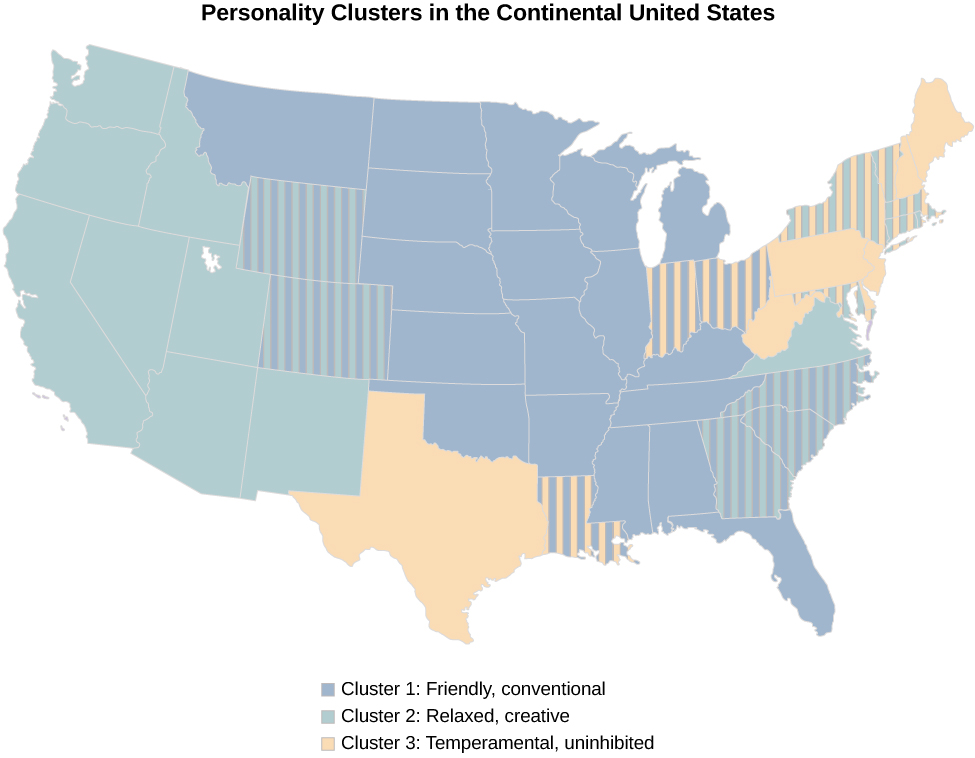| << Chapter < Page | Chapter >> Page > |
As you have learned in this chapter, personality is shaped by both genetic and environmental factors. The culture in which you live is one of the most important environmental factors that shapes your personality (Triandis&Suh, 2002). The term culture refers to all of the beliefs, customs, art, and traditions of a particular society. Culture is transmitted to people through language as well as through the modeling of culturally acceptable and nonacceptable behaviors that are either rewarded or punished (Triandis&Suh, 2002). With these ideas in mind, personality psychologists have become interested in the role of culture in understanding personality. They ask whether personality traits are the same across cultures or if there are variations. It appears that there are both universal and culture-specific aspects that account for variation in people’s personalities.
Why might it be important to consider cultural influences on personality? Western ideas about personality may not be applicable to other cultures (Benet-Martinez&Oishi, 2008). In fact, there is evidence that the strength of personality traits varies across cultures. Let’s take a look at some of the Big Five factors (conscientiousness, neuroticism, openness, and extroversion) across cultures. As you will learn when you study social psychology, Asian cultures are more collectivist, and people in these cultures tend to be less extroverted. People in Central and South American cultures tend to score higher on openness to experience, whereas Europeans score higher on neuroticism (Benet-Martinez&Karakitapoglu-Aygun, 2003).
According to this study, there also seem to be regional personality differences within the United States ( [link] ). Researchers analyzed responses from over 1.5 million individuals in the United States and found that there are three distinct regional personality clusters: Cluster 1, which is in the Upper Midwest and Deep South, is dominated by people who fall into the “friendly and conventional” personality; Cluster 2, which includes the West, is dominated by people who are more relaxed, emotionally stable, calm, and creative; and Cluster 3, which includes the Northeast, has more people who are stressed, irritable, and depressed. People who live in Clusters 2 and 3 are also generally more open (Rentfrow et al., 2013).

One explanation for the regional differences is selective migration (Rentfrow et al., 2013). Selective migration is the concept that people choose to move to places that are compatible with their personalities and needs. For example, a person high on the agreeable scale would likely want to live near family and friends, and would choose to settle or remain in such an area. In contrast, someone high on openness would prefer to settle in a place that is recognized as diverse and innovative (such as California).
Individualist cultures and collectivist cultures place emphasis on different basic values. People who live in individualist cultures tend to believe that independence, competition, and personal achievement are important. Individuals in Western nations such as the United States, England, and Australia score high on individualism (Oyserman, Coon,&Kemmelmier, 2002). People who live in collectivist cultures value social harmony, respectfulness, and group needs over individual needs. Individuals who live in countries in Asia, Africa, and South America score high on collectivism (Hofstede, 2001; Triandis, 1995). These values influence personality. For example, Yang (2006) found that people in individualist cultures displayed more personally oriented personality traits, whereas people in collectivist cultures displayed more socially oriented personality traits.
There are three approaches that can be used to study personality in a cultural context, the cultural-comparative approach ; the indigenous approach ; and the combined approach , which incorporates elements of both views. Since ideas about personality have a Western basis, the cultural-comparative approach seeks to test Western ideas about personality in other cultures to determine whether they can be generalized and if they have cultural validity (Cheung van de Vijver,&Leong, 2011). For example, recall from the previous section on the trait perspective that researchers used the cultural-comparative approach to test the universality of McCrae and Costa’s Five Factor Model. They found applicability in numerous cultures around the world, with the Big Five traits being stable in many cultures (McCrae&Costa, 1997; McCrae et al., 2005). The indigenous approach came about in reaction to the dominance of Western approaches to the study of personality in non-Western settings (Cheung et al., 2011). Because Western-based personality assessments cannot fully capture the personality constructs of other cultures, the indigenous model has led to the development of personality assessment instruments that are based on constructs relevant to the culture being studied (Cheung et al., 2011). The third approach to cross-cultural studies of personality is the combined approach, which serves as a bridge between Western and indigenous psychology as a way of understanding both universal and cultural variations in personality (Cheung et al., 2011).
The culture in which you live is one of the most important environmental factors that shapes your personality. Western ideas about personality may not be applicable to other cultures. In fact, there is evidence that the strength of personality traits varies across cultures. Individualist cultures and collectivist cultures place emphasis on different basic values. People who live in individualist cultures tend to believe that independence, competition, and personal achievement are important. People who live in collectivist cultures value social harmony, respectfulness, and group needs over individual needs. There are three approaches that can be used to study personality in a cultural context: the cultural-comparative approach, the indigenous approach, and the combined approach, which incorporates both elements of both views.
According to the work of Rentfrow and colleagues, personalities are not randomly distributed. Instead they fit into distinct geographic clusters. Based on where you live, do you agree or disagree with the traits associated with yourself and the residents of your area of the country? Why or why not?

Notification Switch
Would you like to follow the 'Psychology' conversation and receive update notifications?